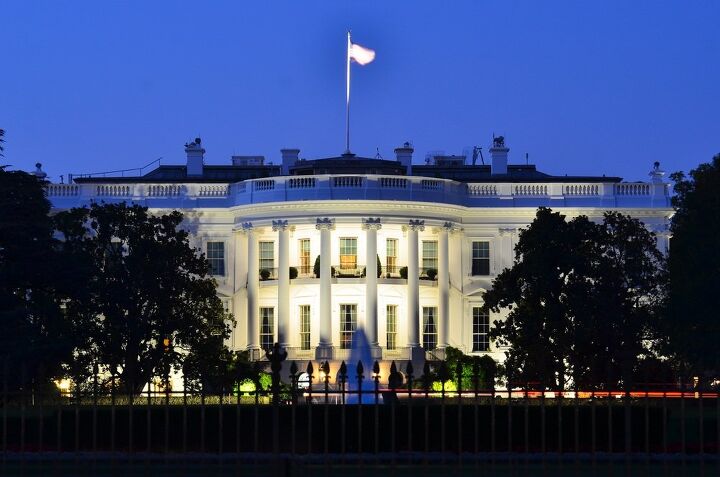Auto Lobbyists Attempt to Soften USMCA, Look to White House [UPDATED]

Lobbyists are reportedly seeking to soften the United States-Mexico-Canada Agreement (USMCA) now that there are some new faces in the White House. Signed in 2018, revised in 2019, and effective since 2020, the USMCA sought to restore North America’s manufacturing base with new content requirements and place the United States in a more favorable position than it held under the North American Free Trade Agreement. But industry groups are now claiming that interpretations from government agencies are gumming up the works, and accusing the U.S. of having a different interpretation from what the other nations had originally agreed upon.
“[The USCMA interpretation makes] meeting the … content provisions that much more difficult for everyone to achieve,” stated David Adams, president of Global Automakers of Canada.
Adams is likely upset that North American manufacturers have to source so much of the materials of the vehicles they produce from local suppliers, framing the entire agreement as a decidedly U.S. approach. The Trump administration specifically enacted the USMCA to give the United States more favorable positioning than it had under the North American Free Trade Agreement (NAFTA). Signed in December of 1993, NAFTA became a sore spot for many Americans who accused it of encouraging companies to shift production out of the United States.
Actually deciding whether or not NAFTA was effective remains difficult and is often muddled by politics — everyone wants to support every policy launched by their preferred party. While we’d like to offer a definitive answer to how bad/good NAFTA was, there’s a lot of conflicting information out there. The Economic Policy Institute released a study in 2013 alleging that the deal had obliterated nearly 700,000 high-paying manufacturing jobs from states like Michigan and California in its first decade. But some experts have claimed those would have been offset by increased automation or the changing employment landscape regardless while giving smaller businesses better access to the Canadian and Mexican markets (and vice versa).
NAFTA was contentious even when it was new, with Ross Perot spending a large portion of his time on the campaign trail criticizing it before ultimately losing to Bill Clinton — who signed it into law. Bernie Sanders also bashed it during the 2016 presidential election, along with CAFTA, the Trans-Pacific Partnership, and normalized trade relations with China. He argued that the U.S. had outsourced too much of its manufacturing already and desperately needed to prioritize job retention and helping the middle and working classes. At roughly the same time, Donald Trump was calling NAFTA ” the single worst trade deal ever approved in [the United States].”
Obviously, this set the stage for Trump to push through the USMCA, which brings us back to the lobbyists. The new agreement’s rules of origin requirements stipulate that a certain portion of an automobile’s value must come from inside the governed region. Under NAFTA, that portion was 62.5 percent. But USMCA bumped the figure up to 75 percent — 10 percent less than Trump originally wanted — in a bid to secure localized manufacturing.
Content rules don’t come into full effect in 2023. But industry groups from all member nations are suggesting they don’t want to have to bother tweaking their supply lines to adhere to it. Lobbyists are also alleging confusion from Canada and Mexico on how customs are supposed to assess how these content requirements are quantified, according to Automotive News.
Adams claimed it’s far too stringent and expensive for the industry to handle: “This interpretation was entirely unexpected, and if it sticks, it will take many manufacturers time to make adjustments and potentially rejigger supply chains to avoid the tariff. Either way, there are inefficiencies, which [equal] costs,” he said.
From AN:
Matt Blunt, president of the American Automotive Policy Council, said it was “extremely important” that the three countries “work it out as quickly as possible.” Blunt’s group represents General Motors, Ford Motor Co. and Stellantis.
“We think it’s important for Canada and Mexico and the United States to resolve this and any issue related to the USMCA quickly, but certainly one as significant as this one,” he said.
“It should really be treated as a diplomatic priority, in our view, to ensure that the USMCA is properly implemented.”
Unfortunately, any changes made to appease the industry or the other two member nations by the United States ultimately weakens its own position. It would also be an incredibly bad look for Joe Biden to undo a trade agreement that took years to negotiate and hadn’t had adequate time to get off the ground. He’s used numerous executive orders to undo Trump-era policies already and would undoubtedly take flak for neutering the USMCA. But Adams said he hoped Katherine Tai, Biden’s nominee for U.S. trade representative, might be willing to take action instead. Automotive News cited an anonymous source claiming that would likely be the plan.
“It would be very hard for Biden to say, ‘No, we side with the industry and Canada and Mexico, and we want to let you roll up’ because that would mean less content [sourced from] North America,” the insider said, adding that they expected it to be “quietly resolved” by Tai.
[Update 3/15/2021: Mr. Adams reached out to us to express his displeasure regarding how we characterized him and the situation. He has asked that we issue a correction or retraction and criticized us for inserting our “own narrative on a story that is not there.” We’ve informed him that we’re inclined to let lobbyists do their own work and are awaiting his response.]
[Image: Orhan Cam/Shutterstock]

A staunch consumer advocate tracking industry trends and regulation. Before joining TTAC, Matt spent a decade working for marketing and research firms based in NYC. Clients included several of the world’s largest automakers, global tire brands, and aftermarket part suppliers. Dissatisfied with the corporate world and resentful of having to wear suits everyday, he pivoted to writing about cars. Since then, that man has become an ardent supporter of the right-to-repair movement, been interviewed on the auto industry by national radio broadcasts, driven more rental cars than anyone ever should, participated in amateur rallying events, and received the requisite minimum training as sanctioned by the SCCA. Handy with a wrench, Matt grew up surrounded by Detroit auto workers and managed to get a pizza delivery job before he was legally eligible. He later found himself driving box trucks through Manhattan, guaranteeing future sympathy for actual truckers. He continues to conduct research pertaining to the automotive sector as an independent contractor and has since moved back to his native Michigan, closer to where the cars are born. A contrarian, Matt claims to prefer understeer — stating that front and all-wheel drive vehicles cater best to his driving style.
More by Matt Posky
Latest Car Reviews
Read moreLatest Product Reviews
Read moreRecent Comments
- SCE to AUX I don't really understand what this money does, but if it's for The Children, then I'm all for it.
- Redapple2 Super looking. 4000lbs and $75,000 out the door and i d be tempted.
- SCE to AUX Agree 100%.But I'm not sure how rare false positives are. My rental Model 3 hit the brakes twice during the week I had it - very unnerving at highway speeds. I think I disabled it once I found the setting inside the terrible menu system.Even my Santa Fe had this problem in stop-and-go traffic, and I disabled it.So what's the benefit of a poor driving aid that makes people want to disable it?
- Mike Beranek No interior pictures usually means that the interior looks like death warmed over.
- Kwik_Shift_Pro4X Oof. (again)Not looking good.


































Comments
Join the conversation
Rereading the article I realized the high and mighty president of the Global Automakers of Canada was quoted using the word: "rejigger". Ironically enough he implies his group members would exercise creative ethics in further calibrating their supply chains, as defined by Dictionary.com: "to change or rearrange in a new or different way, especially by the use of techniques not always considered ethical." https://www.dictionary.com/browse/rejigger How did you get that job again, Mr. Adams?
The Tacoma plays by USMCA rules but has 0.0% US content. So what's it taxed at?